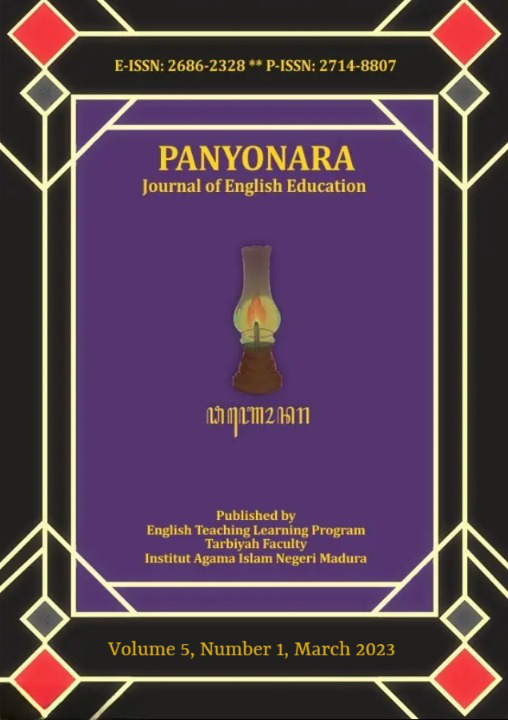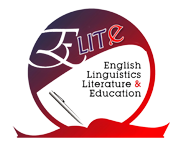EFL Students’ Self-Regulation in Online Learning during the Covid-19 Pandemic
 Abstract views: 202
,
Abstract views: 202
,
 PDF downloads: 235
PDF downloads: 235
Abstract
This study investigates self-regulation in online learning during the Covid-19 pandemic, specifically how students regulate their learning activities amidst challenging circumstances. This research focuses on the challenges faced by students in online learning and the strategies students employed to regulate their learning process. The participants of this study were 38 students from two private universities in Indonesia. Data were collected through FGD and analyzed by using open coding. The results of this study revealed that students dealt with difficulties during online learning, specifically related to an internet connection, an unsupportive learning environment, and negative emotions. However, they utilized self-regulated learning strategies to support them in online learning activities such as self-consequating, environmental structuring, emotion regulation, and time management.
Downloads
References
Arkoful, V. & Abaido, N. (2014). The role of e-learning, the advantages and disadvantages of its adoption in higher education. International Journal of Education and Research, 2(12), 397-410.
Azhari, B. & Fajri, I. (2022). Distance learning during the Covid-19 pandemic: School closure in Indonesia. International Journal of Mathematical Education in Science and Technology, 53(7), 1934-1954. https://doi.org/10.1080/0020739X.2021.1875072
Cho, Y. A. & Kim, Y. (2019). The relationship between self-efficacy beliefs and self-regulated learning strategies in Korean EFL learners. The Linguistics Association of Korea Journal, 27(3), 53-74. https://doi.org/10.24303/lakdoi.2019.27.3.53
Clandinin, D. J. & Caine, V. (2013). Reviewing Qualitative Research in the Social Sciences. Oxfordshire: Routledge.
Corno, L. (1993). The best laid plans: Modern conceptions of volition and educational research. Educational Researcher, 22(2), 14-22.
Dhawan, S. (2020). Online learning: A panacea in the time of Covid-19 crisis. Journal of Educational Technology Systems, 49(1), 5-22. https://doi.org/10.1177/0047239520934018
Gacs, A., Goertler, S., & Spasova, S. (2020). Planned online language education versus crisis-prompted online language teaching: Lessons for the future. Foreign Language Annals, 53(2), 380-392. https://doi.org/10.1111/flan.12460
Kulusakli, E. (2022). Exploring self-regulated online learning skills of EFL learners in distance education. Turkish Online Journal of Distance Education, 23(1), 86-96). https://doi.org/10.17718/tojde.1050356
Manegre, M. & Sabiri, K. A. (2020). Online language learning using virtual classroom: An analysis of teacher perceptions. Computer Assisted Language Learning, 5(6), 973-988. https://doi.org/10.1080/09588221.2020.1770290
Meşe, E. & Sevilen, Ç. (2021). Factors influencing EFL students’ motivation in online learning: A qualitative case study. Journal of Educational Technology & Online Learning, 4(1), 11-22.
Morshedian, M., Hemmati, F., & Sotoudehnama, E. (2016). Training EFL Learners in self-regulation of reading: Implementing an SRL model. Reading & Writing Quarterly, 33(3), 290-303. https://doi.org/10.1080/10573569.2016.1213147
Nartiningrum, N. & Nugroho, A. (2020). Online learning amidst global pandemic: EFL students’ challenges, suggestions, and needed materials. English Franca, 4(2), 115-140. https://doi.org/10.29240/ef.v4i2.1494
Pasaribu, T. A. (2020). Challenging EFL students to read: Digital reader response tasks to foster learner autonomy. Teaching English with Technology, 20(2), 21-41.
Prasetyawati, O. A. & Ardi, P. (2020). Integrating Instagram to EFL writing to foster student engagement. Teaching English with Technology, 20(3), 40-62.
The journal uses an Open Access policy under a Creative Commons Attribution-NonCommercial 4.0 International License. Authors who publish with this journal agree to the following terms:
- Authors retain copyright and grant the journal right of first publication with the work simultaneously licensed under a Creative Commons Attribution License that allows others to share the work with an acknowledgment of the work's authorship and initial publication in this journal.
- Authors are able to enter into separate, additional contractual arrangements for the non-exclusive distribution of the journal's published version of the work (e.g., post it to an institutional repository or publish it in a book), with an acknowledgment of its initial publication in this journal.
- Authors are permitted and encouraged to post their work online (e.g., in institutional repositories or on their website) prior to and during the submission process, as it can lead to productive exchanges, as well as earlier and greater citation of published work.
















